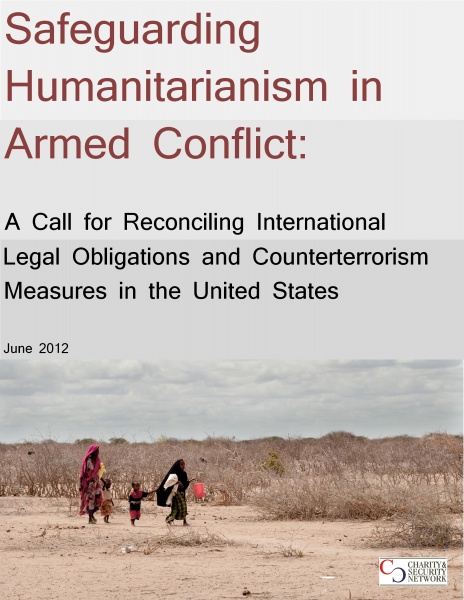
A June 2012 report by the Charity & Security Network- Safeguarding Humanitarianism in Armed Conflict: A Call for Reconciling International Legal Obligations and Counterterrorism Measures in the United States– examines how the international humanitarian obligations of the U.S. conflict with domestic counterterrorism measures when applied to charities seeking to aid civilians in areas of armed conflict. While the negative impact of these measures has been criticized as a matter of policy and subjected to Constitutional challenges, significantly less attention has been paid to how they stack up against the international humanitarian obligations of the U.S. This report fills that gap.
Read the report online (no download necessary) or
Download the Full Report (2.3 MB)
Download Executive Summary (0.6 MB)
After a review of U.S. counterterrorism laws impacting charities, the report explains the legal framework of international humanitarian law (IHL), focusing on provisions that address civilian relief operations during situations of armed conflict. It then analyses how current U.S. counterterrorism laws and enforcement policies, particularly the broad prohibition on material support to terrorism, do not adequately incorporate these provisions and are inconsistent with humanitarian principles and obligations. CSN urges the U.S. to work with the nonprofit sector to better incorporate international humanitarian law principles and concepts into U.S. law and enforcement policy.
It concludes that:
- The material support statute and economic sanctions programs effectively block access to civilians in need of humanitarian relief by barring logistical negotiations with listed groups when necessary to access civilians and treating incidental, minimal leakage of aid in the same manner as deliberate distribution of aid to terrorist groups;
- U.S. law imposes a permanent ban on any form of engagement with a listed group (with a very narrow exemption for medicine and religious materials) when international humanitarian law allows only temporary restrictions on access to civilians;
- The Treasury Department’ licensing process is an ineffective means of allowing access to civilians.
- U.S. law and policy do not respect the status of neutral and impartial humanitarian relief organizations.
